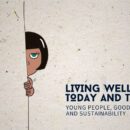“In seeking to free ourselves from the language of the economy, we risk seeing our task as somehow separate from the social system that guides and shapes our every move, whether we like it or not.” In his speech for the recent Wellbeing Economy Forum hosted by the Icelandic Government in June 2023, CUSP director Tim Jackson is looking at the relationship between the ‘wellbeing economy’ and the ‘growth economy’, and where the logic of wellbeing differs from the logic of growth.
. . .
Thank you for inviting me to Reykjavík. I’m sad I can’t be there in person. But as it happens, I’m recording this talk from the highlands in Scotland, which brings me at least some sense of northern latitudes, long days and bright nights. I am with you in spirit.
I wonder if I’m right in thinking that this first ever Wellbeing Economy Forum owes something in its concept—or at least in its naming—to the World Economic Forum which was founded by Klaus Schwab back in 1971? That Forum in Davos has become almost mythical in its global status over the last half a century.
Every culture creates its own myth, of course. Myth is essential to the stories we tell, the narratives we weave. Myth is how we conceive of place in the world and imagine the future.
Our prevailing myth is the myth of growth: the idea that more and more is synonymous with better and better. Davos has been the worldly incarnation of that myth. Over the last fifty years it’s become a meeting place for the great and the good and a powerful advocate for the growth-based economy.
But the limitations of eternal growth have become increasingly apparent. Most obviously it seems less and less attractive on a finite planet, particularly if the accumulated wealth cannot realistically be shared without destroying the integrity of the fragile ecosystems on which our children’s future depends.
Which is why there is so much to applaud in Prime Minister Katrín Jakobsdóttir’s framing of the Wellbeing Economy Forum as ‘a unique opportunity to explore the critical links between human wellbeing and environmental sustainability’.
There is a wisdom in framing the wellbeing economy in terms of ultimate ends (human wellbeing) and ultimate means (our finite planetary resources). And there’s something sensible in not assuming any particular form of economic organisation to achieve those ends. We are already too captured by the language of economics. Its logic has a tendency to force our discussions into particular frames that suppress our ability to think creatively, to think differently about the future.
Yet there’s also a danger involved. In seeking to free ourselves from the language of the economy, we risk seeing our task as somehow separate from the social system that guides and shapes our every move, whether we like it or not.
And that’s why I’d like to spend a little time today on clarifying the relationship between the wellbeing economy and the growth economy. To identify where the logic of wellbeing differs from the logic of growth. To distinguish, if you will, between Reykjavík and Davos.
In pursuit of that, let me briefly present three different characterisations of that relationship.
In the first, the wellbeing economy is a kind of add-on to the conventional economy. Something that we can afford to think about once we have the main business of the economy settled and sorted.
In this conception, the wellbeing economy represents the sunny uplands of infinite possibility that growth delivers us to. Wellbeing is not exactly a parasite, but perhaps something of a luxury. The icing on the growth-baked cake.
I’m not suggesting anyone here thinks like this. But it is in some sense the prevailing mainstream view. Wellbeing is that part of the economy that we can only afford if we first fix growth.
A more recent framing turns that idea at least partially on its head. Without wellbeing there is no growth. Without health there is no wealth, as the English social critic John Ruskin once said. It’s an argument rehearsed in a Conclusion adopted by the EU Council back in 2019.
‘The Economy of Wellbeing’, said the Council, ‘is vitally important for the Union’s economic growth, productivity, long-term fiscal sustainability and societal stability’. A snazzy Council infographic shows us a virtuous circle in which growth delivers wellbeing and wellbeing delivers growth.
There’s clearly some logic to this. Health and the economy are obviously interdependent, as the World Health Organisation’s Health for All report pointed out last month.
But again, surprisingly perhaps, there is a danger. Policy makers might be very happy to invest in health and education and social care for example, so long as they can see the upside for growth, and so long as that upside arrives before the next election. But there’s a sense in which ‘wellbeing equals growth’ is as treacherous a guide as ‘wellbeing equals luxury’. Policy prescriptions both default to a reliance on economic growth. Reykjavík is subordinate to Davos.
Within months of that EU Council Conclusion the world was thrown upside down by the arrival of the coronavirus pandemic. Its lessons were profound. First and foremost, it became blindingly obvious that in protecting human wellbeing we must sometimes forego wealth. Health matters irrespective of wealth.
A fascinating implication follows from this. Conceiving prosperity as health rather than wealth guides us immediately away from growth. Health is not about having more and more.
When you don’t have enough food to survive, when the harvest has failed again, the sanitation is non-existent, the house is falling down, the well has run dry or become polluted, then having more—having anything—is a no-brainer.
But today across the world, according to the WHO, more people die from diseases of over-consumption(obesity, hypertension, diabetes) than die of malnutrition. It’s an extraordinary indictment of the profit maximisation within the fast-food industry and the philosophy of more that legitimates them.
Capitalism’s fundamental conceit—one of its many conceits—is that, in striving relentlessly for ‘more’, we lose sight of where ‘enough’ might lie. And we have no way of stopping when we get there.
But health is clearly more nuanced than this. It involves what Aristotle called a ‘virtuous’ balance between deficiency and excess. It positions itself directly counter to the myth of growth.
A more surprising conclusion follows: To deliver health, we need an economy whose guiding principle is care. The care and attention of one human being to another and to the conditions of living lies at what Nancy Folbre called the ‘invisible heart’ of the economy. While Adam Smith’s invisible hand is busy insisting that we are all selfish consumers, Folbre point out that without care we are nothing. Our children would lead stunted lives. The sick would find no respite. The dying no solace.
Without care there is no wellbeing. Not even at the most basic level. The Covid pandemic may already be slipping from our minds. But its lessons remain. The care economy is not just a sideshow in the search for a wellbeing economy. It is the blueprint for it.
I suspect many in this audience would agree with that conclusion. And yet care is an anathema to capitalism. Its virtues are capitalism’s vices. Its rich foundation for meaningful work is capitalism’s ‘productivity crisis’. To the mainstream economist, the time-intensive work of care translates as low or stagnant productivity. The thing that’s ‘holding us back’ from the growth we are so obsessed with.
And things get worse.
In the so-called social contract of neoliberal economics, wages follow productivity. Because care takes time, care workers are condemned to pitiful wages, insecure jobs, impossible working conditions and – pandemic aside – the lowest ranks in the status game played out in modern society. Capitalism condemns care, not accidentally, not inadvertently, but systematically.
Of course, you don’t need me to tell you that most of the people working in the care sector (paid and unpaid) are women. You don’t need me to tell you that the game of productivity is rigged. Rigged in favour of men. Possibly. Rigged in favour of what the late Herman Daly called uneconomic growth. Probably. Rigged in favour of those who profit from distress and ecological devastation. Definitely.
Which is why this third characterisation of the relationship between Reykjavík and Davos matters. Our job in rescuing the care economy is not just to applaud the nurses from our doorsteps, or support their strikes for decent pay. It’s not just to rail against capitalism—though that of course is one of great joys of our time.
Our job is to reconceive economy as care. To equalise the horrendous health inequalities that condemn so many to unhappy unhealthy lives. To build some concept of universal basic services. To protect the rights, wages and living conditions of care workers. To reform the distorted productivity that robs care of meaning. To constrain the rent-seeking behaviour of private firms intent on extracting value from people’s infirmity. To reframe primary health care as a lifelong strategy of positive health.
Our job is to build a new myth better suited to our human condition as a mortal species on a finite planet on the edge of an inhospitable galaxy in the middle of a mysterious universe, revealed in all its glory—for those of you lucky enough to be there—in the bright nights of Reykjavík.
In fifty years or so, when the Wellbeing Economy Forum is as old as the World Economic Forum is now, it will sadly be too late for me to enjoy that experience with you. So please do ask me back before that. And in the meantime, thank you for your attention.
Image: courtesy of Matheus Bertelli / pexels.com. This post also appeared on the CUSP website.







